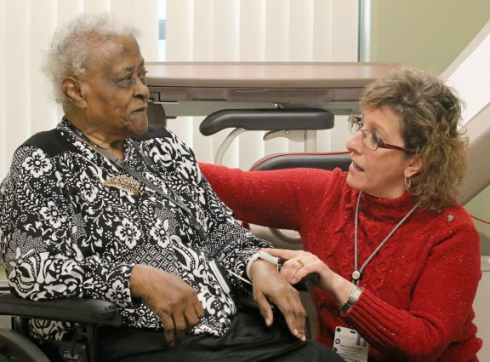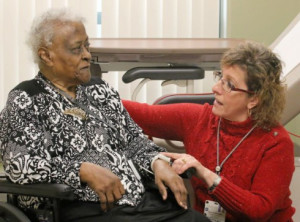
By: Shivani Gosai | Student Columnist

Millions of Americans and their families struggle with everyday tasks due to dementia or Alzheimer’s disease. It has wistfully become the 6th leading cause of death in the United States, according to the Alzheimer’s Association.
A recently published study has uncovered new evidence of a decline in dementia cases due to increased education and better cardiovascular health in the population. The New England Journal of Medicine published the study on Feb. 11, and it provided statistics supporting the theory that citizens with more education and healthier hearts are decreasing their risks of dementia.
This study can be extremely helpful to stave off dementia, although it cannot be fully avoided. The research from the study displays evidence of dementia decreasing, but our optimism will decline because the disease is only going to become more prevalent. Because the Baby-Boomer generation is getting older, the rates of the mental disorder will increase. The study is evasive, and people should be aware of dementia.
Dementia is a term for a set of symptoms such as impaired thinking and memory loss. The Alzheimer’s Association states that “one of the greatest mysteries of the disease is why risk rises so dramatically as we grow older.” They report that one in nine people age 65 or older has Alzheimer’s. More of their statistics show that over 5 million Americans are living with Alzheimer’s and dementia, and nearly one in three senior citizens dies each year from the diseases. Dementia is inevitable as you age, but the Alzheimer’s Association is still working toward a cure.
The cost of health care and treatments for dementia can be expensive. But the study indicates that the overall cost of living with dementia will not be as overpriced as predicted because more senior citizens will be able to live independently for a longer period of time. This will be beneficial to lower income families or families who are struggling with student loans and college costs.
According to the American Psychological Association, adults who take college courses can reduce their risk for developing dementia or Alzheimer’s. Their research shows that studying at a college-level can increase cognitive ability, therefore strengthening the brain and holding off dementia.
The statistics from the New England Journal of Medicine study does not apply to all races, however. The participants of the dementia study were mainly white, suburban males and females over 60 years old. The study would have benefitted from including multiple races, to increase their research of dementia in all ethnicities. Dementia, after all, will affect most people in old age regardless of their ethnicity.
A separate study, published by the Alzheimer’s Association, displayed significant results of dementia decreasing in African Americans. The specific reason for this decrease is still being researched. The results of this study were similar to those of the New England Journal of Medicine study. According to the Alzheimer’s Association, elderly African-Americans are more likely to have dementia than any other racial group in the United States, while Hispanics and Caucasians are half as likely.
The New England Journal of Medicine’s study on dementia can be slightly misleading. It leads people to believe that dementia is declining when in fact it is rising; the study only gives insight on how to stave off dementia. The disease will only become an even bigger problem because of the aging population. Although the research is helpful and may help towards finding a cure, it is hard to be optimistic about upcoming dementia rates.
One’s practice of healthy traits such as exercise and not smoking can strengthen the heart as well as decrease chances of dementia in later life. Sarah Wallace Ph.D., a professor in the Department of Speech-Language Pathology at Duquesne University, said, “There’s actually a type of dementia called vascular dementia which happens when your veins and arteries [start to] get clogged up, which is similar to what happens when you have a heart attack. So it’s a very similar phenomenon where the blood doesn’t travel to the brain as easily as it used to, and that can cause vascular dementia.”
The study indicates that educated people are more likely to develop dementia in later life rather than early elderly years. The exact reason education staves off dementia is unknown, although most researchers believe that higher education leads to better jobs, which will ultimately lead to healthier lifestyles and better medical care. Other researchers believe that learning generates neural connections, which supports the brain later when cognitive function and memory become delayed. Lower amounts of education may reflect lower socioeconomic status, which may increase one’s likelihood of poor nutrition and decrease the ability to afford health care or obtain certain treatments.
Although no cure for dementia or Alzheimer’s exists, certain treatments as well as healthy lifestyles can improve the quality of life for the elderly. Recent studies are coming out with more and more opportunities for adults to stave off the diseases. Dementia needs widespread awareness because millions of people’s daily lives are severely affected. Anyone can help support vital research for Alzheimer’s and dementia by donating to the Alzheimer’s Association, or persuading Congress to address the needs and rights of people with Alzheimer’s and their families.
For further information on dementia and Alzheimer’s solutions, Duquesne University will be holding a seminar featuring Michelle Bourgeois, Ph.D., a professor in the Department of Communication Sciences and Disorders from the University of South Florida. The seminar will be held on Monday March 21, 2016 in the Power Center Ballroom. For more information contact slpconference@duq.edu.





Very well written and informative. I’m now interested to attend the seminar and learn more about what’s being done towards preventing and curing this disease.